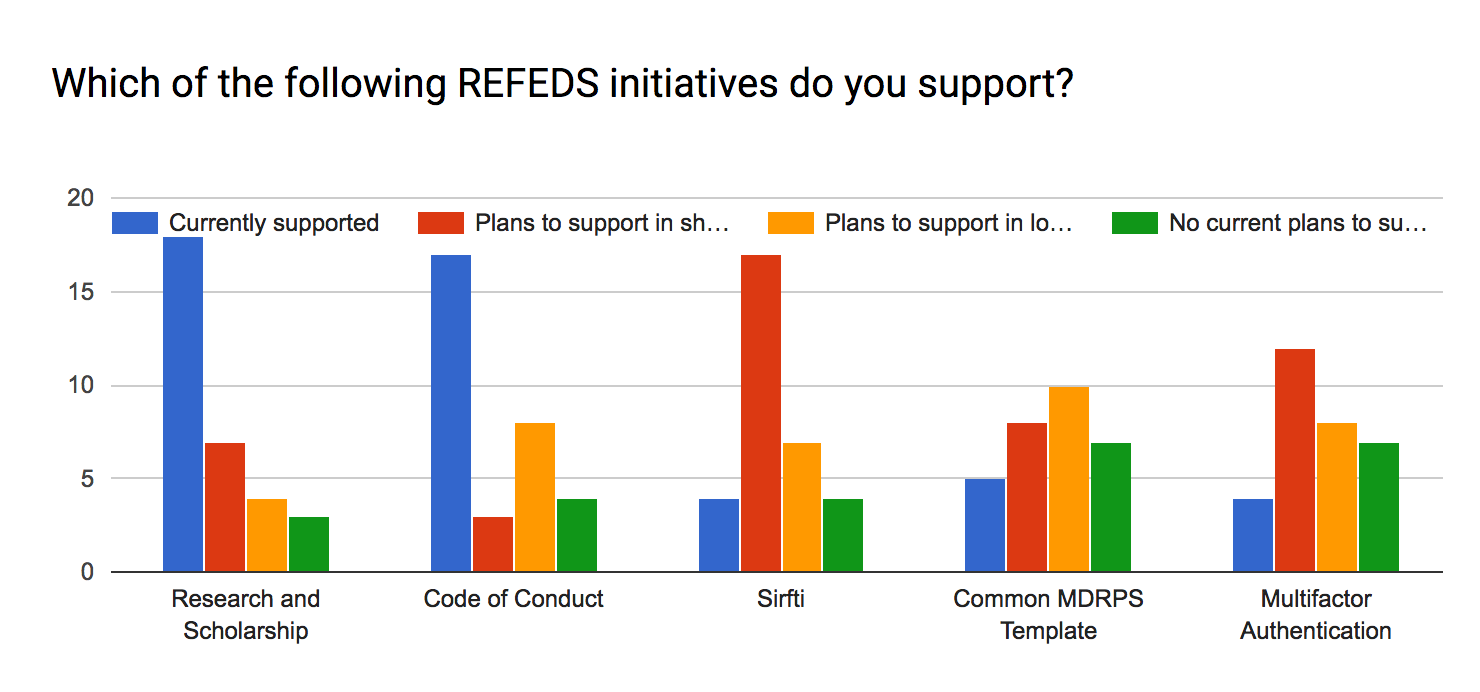REFEDS met from the last time in 2016 on 28th November 2016, kindly hosted by CERN and co-located with the 4th AARC General meeting. As usual, the meeting was focused on reviewing the results of the annual REFEDS survey and designing the 2017 workplan for REFEDS.
REFEDS Survey
33 out of 66 federations answered the REFEDS survey. The survey results will be formally written up but some of the main take-aways from the survey this year are shown below.
Organisational
- We are seeing an increase in hybrid approaches being adopted by federations, with operators offering both mesh and hub-and-spoke style service offerings under the same framework.
- Budget and personnel are very inconsistent across federations – with the most worrying statistics being 16 federations having no dedicated budget, and federations with manpower of only 0.1 FTE per annum. This level of funding will no allow operators to respond to the requirements being requests from federation users.
- Federation operators are struggling to dedicate time to communication activities and this tends to be something that falls down the agenda. This may mean that projects such as REFEDS, AARC and GN4 need to do more to support this space.
Technology Support
- SAML is still clearly the dominant technology within federations but there is increasing interest in adding support for Open ID Connect (OIDC) in the short-term.
- Support for Research and Scholarship and the Code of Conduct continues to increase, but only 6.6% of the total IdPs in eduGAIN currently support R&S, with a slightly lower percentage for CoCo. It is essential that federations do as much as they can to increase IdP engagement with these entities.
- There is significant interest in Sirtfi and commitment from federations to support Sirtfi roll-out. This matches general trends towards an increased awareness and focus on security within NRENs and NREN services.
Metadata Management
Questions around metadata management unearthed some issues with the way federations are operating locally in terms of how we provide service globally.
- Federations are using many many different federation registry tools, nearly all of which have been designed and developed by federations. It may be worth thinking about how this effort could be combined and better applied to support fewer tools from a sustainability perspective. Work to ensure that data can be consistently mapped across the different tools is also a priority area.
- Approaches taken by federations to supporting and publishing eduGAIN metadata to local members is vastly inconsistent. A strong recommendation would be to reduce this to a few core approaches with clear guidance from eduGAIN as to preferred practice.
Priorities
The final section of the survey focused on priorities for federations in 2017. The graphic below shows the top 5 areas from the federations that responded.
REFEDS 2017 Workplan
The second half of the meeting was dedicated to discussing proposals from the crowd-sourced list, provided by REFEDS participants. The proposals will be refined into a formal workplan over the next month for consideration by our sponsors, steering committee and participants, but some of the issues discussed in the meeting include:
- Whether there is any real community driver to move forward with either the affiliation or academia entity category proposals.
- Should work be done to help coordinate the use of tags within metadata that are not globally defined?
- Could REFEDS develop a requirements specification to address the needs for a service catalogue for federations?
- How can federations pool skills to allow us to effectively support areas of federation service and development where there are currently gaps?
- The need to update the REFEDS Discovery Guide with to demo current best practice.
- Ongoing support for developing the operationalisation of Sirtfi and federation incident response across the board.
REFEDS will continue to accept you ideas for 2017 workplan areas until the end of December so please do get in contact if there is something you would like us to address.


